Latin Summer exam grammar
Small Words
Pronouns

Relative pronouns:
Singular:
Case
Masculine
Feminine
Neuter
English Translation
Nominative
qui
quae
quod
who, which, that
Accusative
quem
quam
quod
whom, which, that
Genitive
cuius
cuius
cuius
whose, of whom, of which
Dative
cui
cui
cui
to/for whom, to/for which
Ablative
quo
qua
quo
by/with/from whom, which
Plurals:
Case
Masculine
Feminine
Neuter
English Translation
Nominative
qui
quae
quae
who, which, that (those who/which)
Accusative
quos
quas
quae
whom, which, that (those whom/which)
Genitive
quorum
quarum
quorum
whose, of whom, of which
Dative
quibus
quibus
quibus
to/for whom, to/for which
Ablative
quibus
quibus
quibus
by/with/from whom, by/with/from which
Interrogative pronouns:
Singular:
Case
Masculine
Feminine
Neuter
English Translation
Nominative
quis
quis
quid
who? what?
Accusative
quem
quam
quid
whom? what?
Genitive
cuius
cuius
cuius
whose? of whom? of what?
Dative
cui
cui
cui
to/for whom? to/for what?
Ablative
quo
qua
quo
by/with/from whom? by/with/from what?
Plurals:
Case
Masculine
Feminine
Neuter
English Translation
Nominative
qui
quae
quae
who, which, that (those who/which)
Accusative
quos
quas
quae
whom, which, that (those whom/which)
Genitive
quorum
quarum
quorum
whose, of whom, of which
Dative
quibus
quibus
quibus
to/for whom, to/for which
Ablative
quibus
quibus
quibus
by/with/from whom, by/with/from which
Prepositions
Accusative Prepositions:
ad (to), per (through), in (into), prope (near), apud (among/at the house of)
Ablative Prepositions:
cum (with), sine (without), de (about, concerning), in (in/on), sub (under)
Verbs
Here’s a breakdown of the verb tenses in both active and passive voices, with all six persons conjugated using amo, amare, amavi, amatus (to love) as the example.
Present Tense
Active:
1st Person Singular: amo - I love
2nd Person Singular: amas - you love
3rd Person Singular: amat - he/she/it loves
1st Person Plural: amamus - we love
2nd Person Plural: amatis - you (pl.) love
3rd Person Plural: amant - they love
Passive:
1st Person Singular: amor - I am loved
2nd Person Singular: amaris - you are loved
3rd Person Singular: amatur - he/she/it is loved
1st Person Plural: amamur - we are loved
2nd Person Plural: amamini - you (pl.) are loved
3rd Person Plural: amantur - they are loved
Perfect Tense
Active:
1st Person Singular: amavi - I have loved
2nd Person Singular: amavisti - you have loved
3rd Person Singular: amavit - he/she/it has loved
1st Person Plural: amavimus - we have loved
2nd Person Plural: amavistis - you (pl.) have loved
3rd Person Plural: amaverunt - they have loved
Passive:
1st Person Singular: amatus sum - I have been loved
2nd Person Singular: amatus es - you have been loved
3rd Person Singular: amatus est - he/she/it has been loved
1st Person Plural: amati sumus - we have been loved
2nd Person Plural: amati estis - you (pl.) have been loved
3rd Person Plural: amati sunt - they have been loved
Imperfect Tense
Active:
1st Person Singular: amabam - I was loving
2nd Person Singular: amabas - you were loving
3rd Person Singular: amabat - he/she/it was loving
1st Person Plural: amabamus - we were loving
2nd Person Plural: amabatis - you (pl.) were loving
3rd Person Plural: amabant - they were loving
Passive:
1st Person Singular: amabar - I was being loved
2nd Person Singular: amabaris - you were being loved
3rd Person Singular: amabatur - he/she/it was being loved
1st Person Plural: amabamur - we were being loved
2nd Person Plural: amabamini - you (pl.) were being loved
3rd Person Plural: amabantur - they were being loved
Imperfect Subjunctive
Active:
1st Person Singular: amarem – I might love
2nd Person Singular: amares – you might love
3rd Person Singular: amaret – he/she/it might love
1st Person Plural: amaremus – we might love
2nd Person Plural: amaretis – you (pl.) might love
3rd Person Plural: amarent – they might love
Passive:
1st Person Singular: amarer – I might be loved
2nd Person Singular: amareris – you might be loved
3rd Person Singular: amaretur – he/she/it might be loved
1st Person Plural: amaremur – we might be loved
2nd Person Plural: amaremini – you (pl.) might be loved
3rd Person Plural: amarentur – they might be loved
Pluperfect Tense
Active:
1st Person Singular: amaveram - I had loved
2nd Person Singular: amaveras - you had loved
3rd Person Singular: amaverat - he/she/it had loved
1st Person Plural: amaveramus - we had loved
2nd Person Plural: amaveratis - you (pl.) had loved
3rd Person Plural: amaverant - they had loved
Passive:
1st Person Singular: amatus eram - I had been loved
2nd Person Singular: amatus eras - you had been loved
3rd Person Singular: amatus erat - he/she/it had been loved
1st Person Plural: amati eramus - we had been loved
2nd Person Plural: amati eratis - you (pl.) had been loved
3rd Person Plural: amati erant - they had been loved
Pluperfect Subjunctive
Active:
1st Person Singular: amavissem – I had loved (would have loved)
2nd Person Singular: amavisses – you had loved
3rd Person Singular: amavisset – he/she/it had loved
1st Person Plural: amavissemus – we had loved
2nd Person Plural: amavissetis – you (pl.) had loved
3rd Person Plural: amavissent – they had loved
Passive:
1st Person Singular: amatus essem – I had been loved
2nd Person Singular: amatus esses – you had been loved
3rd Person Singular: amatus esset – he/she/it had been loved
1st Person Plural: amati essemus – we had been loved
2nd Person Plural: amati essetis – you (pl.) had been loved
3rd Person Plural: amati essent – they had been loved
Future Tense
Active:
1st Person Singular: amabo - I will love
2nd Person Singular: amabis - you will love
3rd Person Singular: amabit - he/she/it will love
1st Person Plural: amabimus - we will love
2nd Person Plural: amabitis - you (pl.) will love
3rd Person Plural: amabunt - they will love
Passive:
1st Person Singular: amabor - I will be loved
2nd Person Singular: amaberis - you will be loved
3rd Person Singular: amabitur - he/she/it will be loved
1st Person Plural: amabimur - we will be loved
2nd Person Plural: amabimini - you (pl.) will be loved
3rd Person Plural: amabuntur - they will be loved
Infinitive
Present Active Infinitive:
amare - to love
All the infinitives:
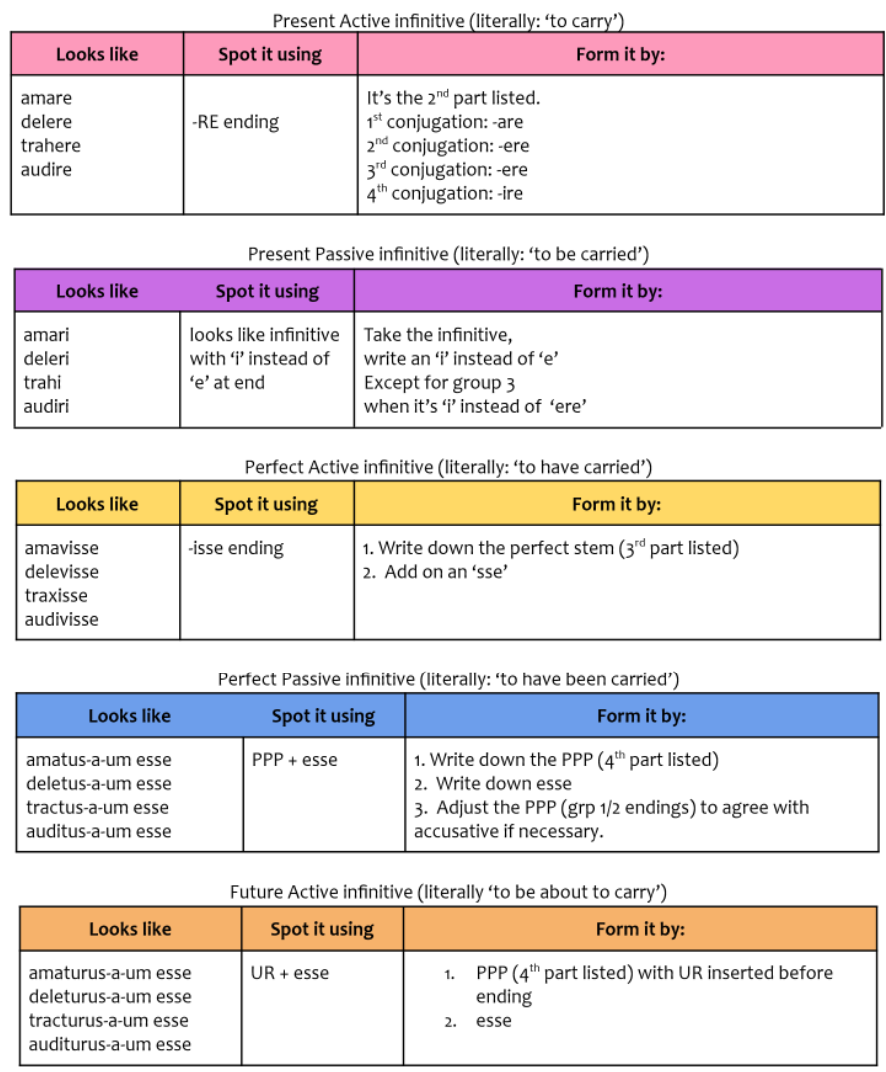
Nouns
Declensions: Review all five declensions (1st to 5th)
Cases: Nominative, Genitive, Dative, Accusative, Ablative, Vocative
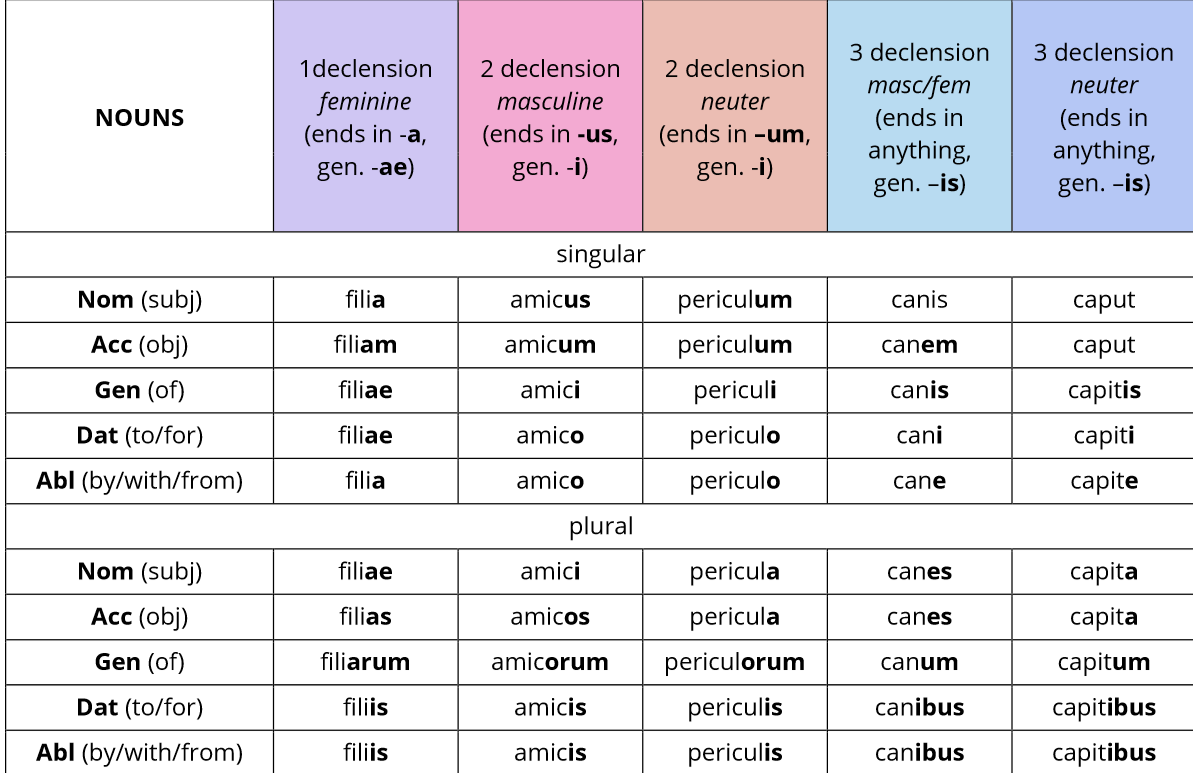
Adjectives and Adverbs
Adjectives:
2-1-2 adjectives (e.g., bonus, -a, -um - good)
3rd declension adjectives (e.g., fortis, forte - brave)
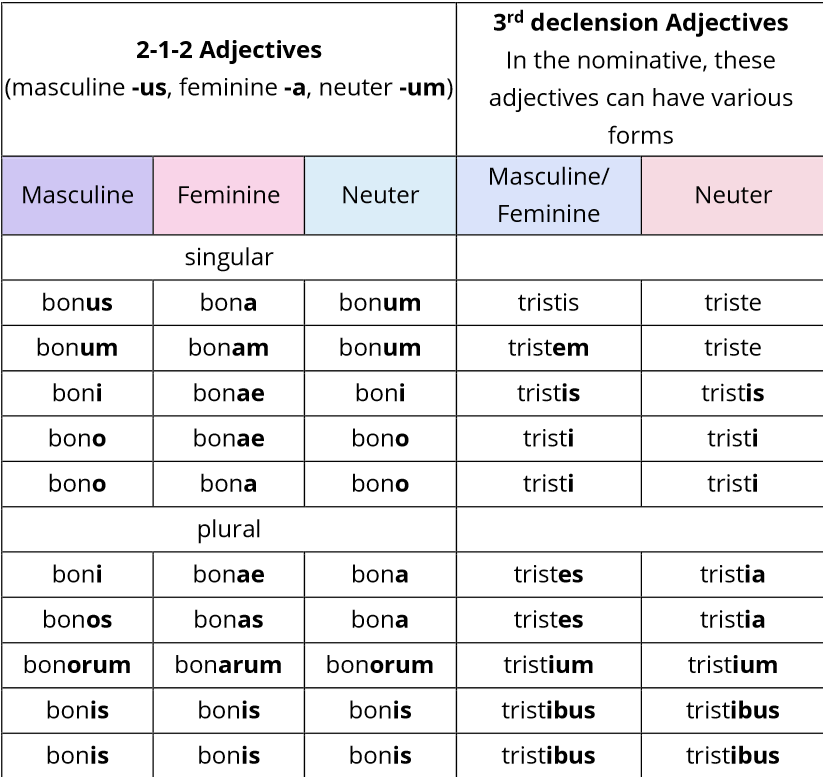
Comparatives and Superlatives:
Comparatives (e.g., fortior - stronger)
Superlatives (e.g., fortissimus - strongest)
Adverbs:
Basic adverbs (e.g., celeriter - quickly)
Comparative adverbs (e.g., citius - more quickly)
Superlative adverbs (e.g., citissime - most quickly)
How to answer grammar questions:
Accusative
Time how long
(Direct) object
After a preposition
Genitive
Possession (of)
Dative
Indirect object (to/for)
Ablative
Time when
Time within which
Abl. Absolute
After a preposition
By/with/ from (on its own)
Infinitive
Complement after volo/ nolo/ possum/ malo/ constituo/ debeo/ iubeo etc.
Indirect speech (head verb + acc + inf)
Participles
Present Active Participle (e.g., amans - loving)
Perfect Passive Participle (e.g., amatus, -a, -um - having been loved)
Irregular Verbs:
Verb "TO BE" (sum, esse, fui)
Present:
I: sum
you (sg): es
he/she/it: est
we: sumus
you (pl): estis
they: sunt
Imperfect:
I: eram
you (sg): eras
he/she/it: erat
we: eramus
you (pl): eratis
they: erant
Future:
I: ero
you (sg): eris
he/she/it: erit
we: erimus
you (pl): eritis
they: erunt
Perfect:
I: fui
you (sg): fuisti
he/she/it: fuit
we: fuimus
you (pl): fuistis
they: fuerunt
Pluperfect:
I: fueram
you (sg): fueras
he/she/it: fuerat
we: fueramus
you (pl): fueratis
they: fuerant
Verb "TO BE ABLE" (possum, posse, potui)
Present:
I: possum
you (sg): potes
he/she/it: potest
we: possumus
you (pl): potestis
they: possunt
Imperfect:
I: poteram
you (sg): poteras
he/she/it: poterat
we: poteramus
you (pl): poteratis
they: poterant
Future:
I: potero
you (sg): poteris
he/she/it: poterit
we: poterimus
you (pl): poteritis
they: poterunt
Perfect:
I: potui
you (sg): potuisti
he/she/it: potuit
we: potuimus
you (pl): potuistis
they: potuerunt
Pluperfect:
I: potueram
you (sg): potueras
he/she/it: potuerat
we: potueramus
you (pl): potueratis
they: potuerant
Verb "TO WANT" (volo, velle, volui)
Present:
I: volo
you (sg): vis
he/she/it: vult
we: volumus
you (pl): vultis
they: volunt
Imperfect:
I: volebam
you (sg): volebas
he/she/it: volebat
we: volebamus
you (pl): volebatis
they: volebant
Future:
I: volam
you (sg): voles
he/she/it: volet
we: volemus
you (pl): voletis
they: volent
Perfect:
I: volui
you (sg): voluisti
he/she/it: voluit
we: voluimus
you (pl): voluistis
they: voluerunt
Pluperfect:
I: volueram
you (sg): volueras
he/she/it: voluerat
we: volueramus
you (pl): volueratis
they: voluerant
Verb "TO NOT WANT" (nolo, nolle, nolui)
Present:
I: nolo
you (sg): non vis
he/she/it: non vult
we: nolumus
you (pl): non vultis
they: nolunt
Imperfect:
I: nolebam
you (sg): nolebas
he/she/it: nolebat
we: nolebamus
you (pl): nolebatis
they: nolebant
Future:
I: nolam
you (sg): noles
he/she/it: nolet
we: nolemus
you (pl): noletis
they: nolent
Perfect:
I: nolui
you (sg): noluisti
he/she/it: noluit
we: noluimus
you (pl): noluistis
they: noluerunt
Pluperfect:
I: nolueram
you (sg): nolueras
he/she/it: noluerat
we: nolueramus
you (pl): nolueratis
they: noluerant
Verb "TO PREFER" (malo, malle, malui)
Present:
I: malo
you (sg): mavis
he/she/it: mavult
we: malumus
you (pl): mavultis
they: malunt
Imperfect:
I: malebam
you (sg): malebas
he/she/it: malebat
we: malebamus
you (pl): malebatis
they: malebant
Future:
I: malam
you (sg): males
he/she/it: malet
we: malemus
you (pl): maletis
they: malent
Perfect:
I: malui
you (sg): maluisti
he/she/it: maluit
we: maluimus
you (pl): maluistis
they: maluerunt
Pluperfect:
I: malueram
you (sg): malueras
he/she/it: maluerat
we: malueramus
you (pl): malueratis
they: maluerant
Verb "TO GO" (eo, ire, ii/ivi, itum)
Present:
I: eo
you (sg): is
he/she/it: it
we: imus
you (pl): itis
they: eunt
Imperfect:
I: ibam
you (sg): ibas
he/she/it: ibat
we: ibamus
you (pl): ibatis
they: ibant
Future:
I: ibo
you (sg): ibis
he/she/it: ibit
we: ibimus
you (pl): ibitis
they: ibunt
Perfect:
I: ii (or ivi)
you (sg): isti
he/she/it: iit (or ivit)
we: iimus (or ivimus)
you (pl): istis
they: ierunt (or iverunt)
Pluperfect:
I: ieram (or iveram)
you (sg): ieras (or iveras)
he/she/it: ierat (or iverat)
we: ieramus (or iveramus)
you (pl): ieratis (or iveratis)
they: ierant (or iverant)
Special tense/verbs:
Uses of the subjunctive:
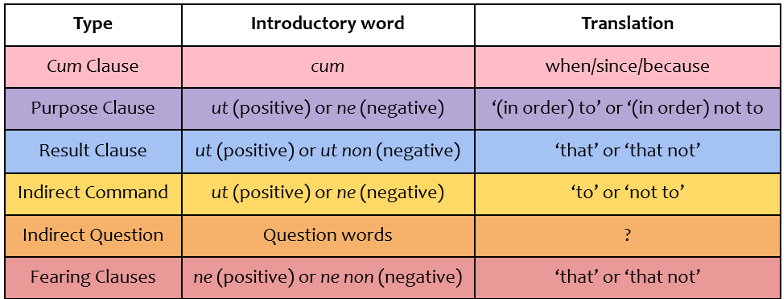
Deponent verbs:
What it is:
Deponent verbs are verbs that are passive in form but active in meaning. They are found in Latin and some other languages.
How it is formed:
Deponent verbs are conjugated using passive endings in all tenses but are translated actively.
Example Verb: Sequor, sequi, secutus sum (to follow)
Full Conjugation Across Tenses:
Present:
sequor (I follow)
sequeris (you follow)
sequitur (he/she/it follows)
sequimur (we follow)
sequimini (you all follow)
sequuntur (they follow)
Imperfect:
sequebar (I was following)
sequebaris (you were following)
sequebatur (he/she/it was following)
sequebamur (we were following)
sequebamini (you all were following)
sequebantur (they were following)
Future:
sequentur (I will follow)
sequeris (you will follow)
sequetur (he/she/it will follow)
sequemur (we will follow)
sequemini (you all will follow)
sequentur (they will follow)
Perfect:
secutus sum (I have followed)
secutus es (you have followed)
secutus est (he/she/it has followed)
secuti sumus (we have followed)
secuti estis (you all have followed)
secuti sunt (they have followed)
Pluperfect:
secutus eram (I had followed)
secutus eras (you had followed)
secutus erat (he/she/it had followed)
secuti eramus (we had followed)
secuti eratis (you all had followed)
secuti erant (they had followed)
Future Perfect:
secutus ero (I will have followed)
secutus eris (you will have followed)
secutus erit (he/she/it will have followed)
secuti erimus (we will have followed)
secuti eritis (you all will have followed)
secuti erunt (they will have followed)
Passives
What it is:
Passive voice indicates that the subject is acted upon by someone or something else.
How it is formed:
In Latin, the passive is formed by using passive verb endings:
Present: -r, -ris, -tur, -mur, -mini, -ntur
Perfect: Passive participle + form of sum
Future perfect and pluperfect use esse forms.
Example Verb: Amare (to love)
Full Conjugation Across Tenses (Indicative):
Present:
amor (I am loved)
amaris (you are loved)
amatur (he/she/it is loved)
amamur (we are loved)
amamini (you all are loved)
amantur (they are loved)
Imperfect:
amabar (I was loved)
amabaris (you were loved)
amabatur (he/she/it was loved)
amabamur (we were loved)
amabamini (you all were loved)
amabantur (they were loved)
Future:
amabor (I will be loved)
amaberis (you will be loved)
amabitur (he/she/it will be loved)
amabimur (we will be loved)
amabimini (you all will be loved)
amabuntur (they will be loved)
Perfect:
amatus sum (I have been loved)
amatus es (you have been loved)
amatus est (he/she/it has been loved)
amati sumus (we have been loved)
amati estis (you all have been loved)
amati sunt (they have been loved)
Pluperfect:
amatus eram (I had been loved)
amatus eras (you had been loved)
amatus erat (he/she/it had been loved)
amati eramus (we had been loved)
amati eratis (you all had been loved)
amati erant (they had been loved)
Future Perfect:
amatus ero (I will have been loved)
amatus eris (you will have been loved)
amatus erit (he/she/it will have been loved)
amati erimus (we will have been loved)
amati eritis (you all will have been loved)
amati erunt (they will have been loved)
Orders
What it is:
Orders in Latin are typically expressed using the imperative mood, which gives commands or requests.
How it is formed:
Present imperative singular: base form of the verb (e.g., ama! - love!).
Present imperative plural: add -te to the base form (e.g., amate! - love, you all!).
Negative commands use noli (singular) or nolite (plural) with the infinitive.
Example:
Positive: Porta libros! (Carry the books!)
Negative: Noli portare libros! (Do not carry the books!)
Conjugations needed:
Only the imperative forms:
Singular: ama, mone, audi (love, warn, listen)
Plural: amate, monete, audite (love, warn, listen)
Ablative Absolute
What it is:
An ablative absolute is a construction consisting of a noun and a participle (both in the ablative case) that provides background information or context.
How it is formed:
Noun/pronoun in the ablative case.
Participle agreeing with the noun in case, number, and gender.
Example:
Hostibus victis, milites laeti erant.
(With the enemies having been defeated, the soldiers were happy.)
Conjugations needed:
Participles in ablative case:
Present participle: -nte/-ntibus (e.g., amante - loving)
Perfect participle: -o/-is (e.g., amato - having been loved).
Gerundives:
A Gerundive is a verbal adjective.
Formed from the verb stem + -ndus, -nda, -ndum endings.
It agrees with a noun in gender, number, and case.
Meaning:
Necessity or obligation ("must be ___ed," "has to be ___ed").
Often translated passively.
Examples:
liber legendus — "the book that must be read"
puella laudanda est — "the girl must be praised"
Indirect statements:
(Accusative and Infinitive Construction)
An indirect statement reports what someone said, thought, heard, or felt.
In Latin:
The subject of the indirect statement is put in the accusative.
The verb is put into the infinitive form.
Key points:
No Latin word for "that" (just understood in translation).
The tense of the infinitive shows the time of the action relative to the main verb.
TENSE OF THE INFINITIVE
Infinitive Tense | When it Happens Compared to Main Verb | Example Translation |
|---|---|---|
Present Infinitive | Same time as the main verb | "that he is doing" or "that he does" |
Perfect Infinitive | Before the time of the main verb (past) | "that he had done" |
Future Infinitive | After the time of the main verb (future) | "that he would do" |
Examples:
Reporting about the Present:
Dicit puerum laborare. — "He says that the boy is working."
(dicit = he says, puerum = boy (acc.), laborare = to work (present inf.)
Reporting about the Past:
Dixit puerum laboravisse. — "He said that the boy had worked."
(dixit = he said, puerum = boy (acc.), laboravisse = to have worked (perfect inf.)
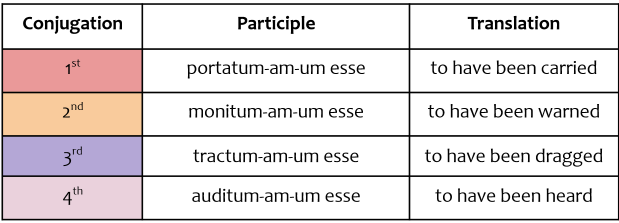
Reporting about Oneself:
Dicit se laborare. — "He says that he himself is working."
Dixit se laboravisse. — "He said that he himself had worked."
(se = himself/herself/itself, reflexive pronoun for the subject of the main verb)
Reporting about the Future:
Dicit puerum laboraturum esse. — "He says that the boy will work."
Dixit puerum laboraturum esse. — "He said that the boy would work."
(laboraturum esse = future active infinitive: "to be about to work")

Quick Reference Table
English Thought | Latin Form |
|---|---|
"that he is working" | accusative + present infinitive |
"that he worked" | accusative + perfect infinitive |
"that he will work" | accusative + future infinitive |
Reflexive (oneself) report | use se in accusative |
Common words used in indirect statements:
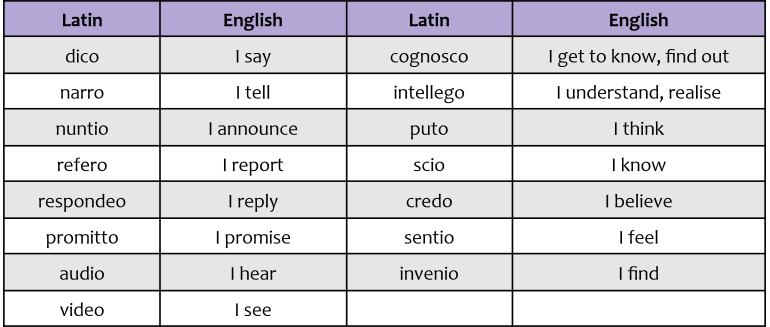
Overview of translating indirect statements
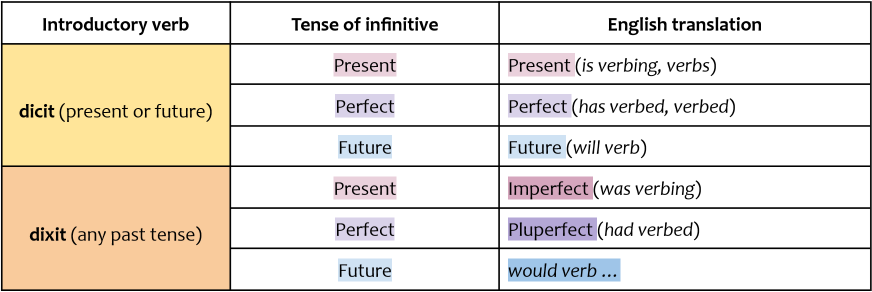
Indirect speech:
Head verb
Accusative
Infinitive - 3 tenses (future, present, perfect)
Infinitives:
Amare: to love
Amari: to be loved
Amavisse: to have loved
Amatus esse (PPP): to have been loved
Amaturus esse (FAP): to be going to love/ to be about to love